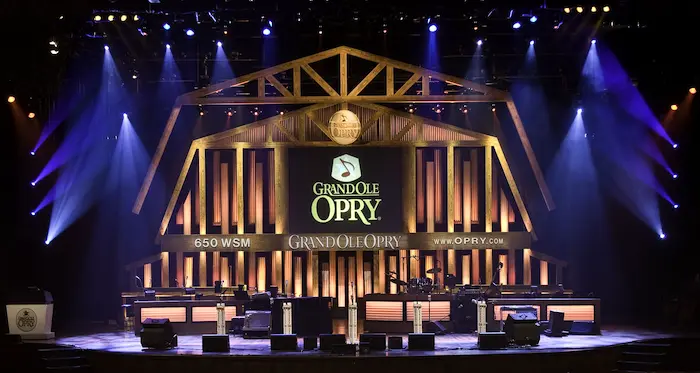In the mid-20th century, television emerged as a powerful medium. It was a way to bring entertainment directly into homes across America. For country music, this was a golden opportunity. Many TV shows of the era showcased country music. However, one show stood out above the rest. “The Grand Ole Opry” was the most significant TV show featuring country music during the 1950s and 60s. Its impact was profound, and its legacy continues today.
I. The Rise of Television and Country Music
1. Early Days of Television
The 1950s was a decade of rapid technological advancement. Television became a staple in American households. Families gathered around their TV sets to watch their favorite programs. This period is often called the Golden Age of Television. It was a time when TV became a dominant force in entertainment.
2. Country Music’s Growing Popularity
Country music was also evolving during this time. The genre was moving from its rural roots to mainstream popularity. Artists like Hank Williams, Patsy Cline, and Johnny Cash were becoming household names. Their music resonated with many Americans, from urban dwellers to rural communities.
3. The Intersection of TV and Country Music
Television provided a platform for country music to reach a wider audience. Shows like “The Ed Sullivan Show” and “The Jimmy Dean Show” featured country music performances. However, it was “The Grand Ole Opry” that truly embodied the spirit of country music.
II. The Grand Ole Opry: A Brief History
1. Origins of The Grand Ole Opry
The Grand Ole Opry started as a radio show in 1925. It was broadcasted from Nashville, Tennessee. The show featured live performances from country music artists. It quickly became a favorite among listeners.
2. Transition to Television
In 1955, “The Grand Ole Opry” made its debut on television. This was a significant milestone for the show and for country music. The TV version brought the live performances and the atmosphere of the Opry to a national audience.
3. Format of the Show
The show retained its radio format. It featured live music, comedy skits, and guest appearances. The TV version added visual elements, allowing viewers to see their favorite performers in action. This visual aspect helped deepen the connection between artists and their fans.
III. Key Performers and Moments
1. Hank Williams
Hank Williams was one of the first major stars of “The Grand Ole Opry.” His emotional performances and soulful voice captivated audiences. Songs like “Your Cheatin’ Heart” and “I’m So Lonesome I Could Cry” became classics. Williams’ appearances on the Opry helped solidify his status as a country music legend.
2. Patsy Cline
Patsy Cline brought a unique style to “The Grand Ole Opry.” Her powerful voice and emotional delivery made her a standout performer. Hits like “Crazy” and “I Fall to Pieces” showcased her talent. Cline’s performances on the Opry helped bridge the gap between country and pop music.
3. Johnny Cash
Johnny Cash’s deep voice and rebellious image made him a favorite on “The Grand Ole Opry.” Songs like “Folsom Prison Blues” and “Ring of Fire” resonated with audiences. Cash’s performances were a highlight of the show, and he became one of its most iconic figures.
4. Memorable Moments
“The Grand Ole Opry” had many memorable moments. One of the most notable was Elvis Presley’s appearance in 1954. This was before he became the King of Rock ‘n’ Roll. Another memorable moment was when Loretta Lynn performed “Coal Miner’s Daughter.” These moments helped shape the history of country music.
IV. The Impact of The Grand Ole Opry
1. Popularizing Country Music
“The Grand Ole Opry” played a crucial role in popularizing country music. The show’s national exposure helped introduce the genre to new audiences. It also helped country music gain respect and recognition as a legitimate art form.
2. Launching Careers
The show was a launching pad for many country music stars. Artists like Dolly Parton, Willie Nelson, and Tammy Wynette got their start on the Opry. The exposure and credibility they gained from the show helped propel their careers.
3. Cultural Impact
“The Grand Ole Opry” had a significant cultural impact. It helped shape the identity of country music and its fans. The show’s blend of music, humor, and storytelling resonated with many Americans. It also helped preserve the traditions and values of country music.
V. The Decline and Legacy
1. Changes in the 1970s
By the 1970s, the landscape of television and music was changing. New genres and formats were emerging. “The Grand Ole Opry” continued to be popular, but its influence began to wane. The show eventually returned to its roots as a radio program.
2. Legacy of The Grand Ole Opry
Despite its decline, the legacy of “The Grand Ole Opry” endures. The show is still broadcasted on radio and is a major tourist attraction in Nashville. The Opry remains a symbol of country music’s rich history and tradition. Its impact on the genre and on American culture is undeniable.
See Also: Unveiling The Ultimate Slow Country Music Playlist
VI. Conclusion
“The Grand Ole Opry” was the most significant TV show featuring country music during the 1950s and 60s. Its transition from radio to television brought country music to a wider audience. The show featured legendary performers and memorable moments. It played a crucial role in popularizing country music and launching the careers of many stars. The Grand Ole Opry’s cultural impact and legacy continue to be felt today. As we look back on this golden age of television and country music, “The Grand Ole Opry” stands out as a shining example of the power of TV to shape and preserve cultural traditions.

